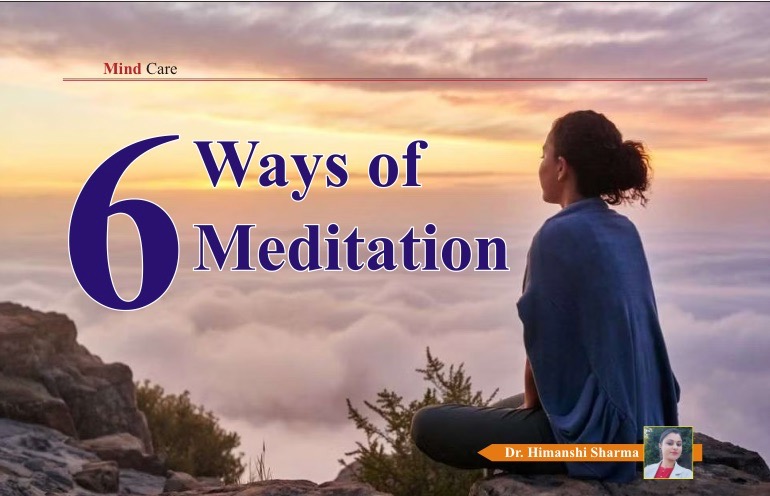To remain physically healthy, one needs to have sound sleep, balanced diet and health promoting positive thoughts and actions.
World Health Organization has defined health as a state of complete physical, mental and social wellbeing of a person and not merely the absence of disease. To be physically healthy, one needs to have sound sleep, balanced diet and health promoting positive thoughts and actions. Mind plays a very vital role in promoting or deteriorating one’s health.
Disorders right from diarrhea to heart attack or cancer can result from a mental turmoil. When one becomes anxious, the intestines work faster and one can develop diarrhea. Likewise, one can manifest a number of illnesses, only because of poor psychological health, so called as psychosomatic disorders.
Effect of Stress on Health
Stress can increase blood & urine amines and steroid hormones to increase blood glucose level, increase heart rate, cause palpitations, sweating difficulty in breathing, numbness and tingling sensation in limbs. It reduces cognitive power so much that one becomes unable to make decisions and concentrate on work. Behavioral changes like excessive drug intake, emotional outburst, excessive eating or loss of appetite, excessive drinking, smoking and restlessness, that further leads to poor health and disturbances in immune system of the person.
Meditation for Stress Management
In the realm of health and healing, an ancient practice offers a beacon of hope known as meditation that can help one to face the stressful situations. Meditation is a natural way to attain the goal in which an individual uses a technique of focusing the mind on a particular object, thought or activity to achieve an emotionally calm and stable state. Through its ability to lower cortisol levels, reduce inflammation and promote relaxation, meditation serves as a potent ally in mitigating the harmful effects of chronic stress on the body.
6 Ways of Meditation
1. Yoga
The regular practice of doing yoga integrates physical postures, breath work and meditation that offers improvement in flexibility and reduction in stress. It provides a versatile and accessible approach to holistic well-being.
2. Visualization
Using the imagination to bring positive changes to the mind and body. This form of guided meditation involves creating vivid mental images that promote relaxation and inner peace.
3. Walking Meditation
Also called as meditation in motion, it is a practice that combines mindfulness with physical movement. It offers a unique way to integrate mindfulness into daily life, as one moves through the world.
4. Prayer
It is the personal and spiritual practice of communication with God and involves components such as confession, seeking guidance, thanks giving, cultivating connection and fostering peace and unity.
5. Sleep Meditation
A practice designed to help individuals relax their mind and body before bedtime, promoting deeper and more restful sleep.
6. Eating Meditation
Eating with a deliberate attitude of awareness and appreciation while loosening the grip of habitual mindless eating. By practising this technique, one can cultivate mindful approach to eating, develop healthier eating habits and enhance overall relationship of food and body.
Meditation is the practice of focussed concentration and bringing oneself back to the moment over and over again. This ancient tradition has a profound potential to heal, restore and transform. From managing stress-related conditions to supporting cancer care and survivourship, meditation offers a holistic approach to wellness. Thus a simple practice of 20 minutes a day with mindfulness can prevent from number of health issues and makes life happy and worth living.
Panchakarma Consultant
K. G. M. Ayurvedic College and Hospital, Nawanshahr Punjab. himanshi969@gmail.com







 Dec 2024
Dec 2024
 May 2024
May 2024
 September 2022
September 2022
 April 2022
April 2022
 October 2020
October 2020
 Jan 2020
Jan 2020
 June 2019
June 2019
 January-February 2019
January-February 2019
 Augest-September
Augest-September
 April 2018
April 2018
 November 2017
November 2017
 June 2017
June 2017
 November 2016
November 2016
 September 2015
September 2015
 March 2015
March 2015
 July 2014
July 2014
 January 2014
January 2014
 July2013
July2013
 March 2013
March 2013
 May 2012
May 2012
 May 2011
May 2011
 Sep 2010
Sep 2010
 Jun 2010
Jun 2010
 Feb 2010
Feb 2010
 December 2009
December 2009
 August 2009
August 2009
 June 2009
June 2009
 Feb 2009
Feb 2009
 December 2008
December 2008
 October 2008
October 2008
 March 2008
March 2008
 July 2008
July 2008
 May 2008
May 2008